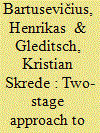|
|
|
Sort Order |
|
|
|
Items / Page
|
|
|
|
|
|
|
| Srl | Item |
| 1 |
ID:
161552


|
|
|
|
|
| Summary/Abstract |
The debate on democratic civil peace has centered on three general claims: democracies have a low risk of civil conflict, autocracies have the same low risk of conflict as democracies, and hybrid regimes have the highest conflict risk. We re-evaluate these claims, emphasizing that previous studies have focused on the aggregate categories of regimes, neglecting the role of particular institutional features. We propose focusing on the electoral qualities of regimes, which constitute the core of democracy, and argue that constraints on electoral contestation generate incentives for opposition to use force. Building on this framework, we distinguish between five regime types according to their electoral features – non-electoral autocracies, single-party autocracies, multi-party autocracies, minimalist democracies, and polyarchies – and specify hypotheses regarding the probability of conflict onset in each. In a global statistical analysis spanning 1817–2006 and employing the new Lexical Index of Electoral Democracy (LIED), we find that polyarchies, characterized by unconstrained contestation, have a lower probability of conflict than any other regime type (although minimalist democracies are only slightly more prone to conflict). Subsequently, we find that single- and multi-party autocracies, characterized by non-competitive elections, are more peaceful than non-electoral autocracies. Our analysis also reveals two factors that are particularly associated with civil peace: the presence of (any form of) elections and minimal electoral competition. Overall, our study underscores the importance of focusing on the central attributes of democracy and sheds new light on the relationship between particular regime features (or types) and civil conflict, thereby contributing to the growing efforts in conflict research to disaggregate political regimes.
|
|
|
|
|
|
|
|
|
|
|
|
|
|
|
|
| 2 |
ID:
165164


|
|
|
|
|
| Summary/Abstract |
We present a two-stage approach to civil conflict analysis. Unlike conventional approaches that focus only on armed conflict and treat all other cases as “at peace,” we first distinguish cases with and without contested incompatibilities (Stage 1) and then whether or not contested incompatibilities escalate to armed conflict (Stage 2). This allows us to analyze factors that relate to conflict origination (onset of incompatibilities) and factors that predict conflict militarization (onset of armed violence). Using new data on incompatibilities and armed conflict, we replicate and extend three prior studies of violent civil conflict, reformulated as a two-stage process, considering different estimation procedures and potential selection problems. We find that the group-based horizontal political inequalities highlighted in research on violent civil conflict clearly relate to conflict origination but have no clear association with militarization, whereas other features emphasized as shaping the risk of civil war, such as refugee flows and soft state power, predict militarization but not incompatibilities. A two-stage approach to conflict analysis can help advance theories of civil conflict, assess alternative mechanisms through which explanatory variables are thought to influence conflict, and guide new data-collection efforts.
|
|
|
|
|
|
|
|
|
|
|
|
|
|
|
|
|
|
|
|
|